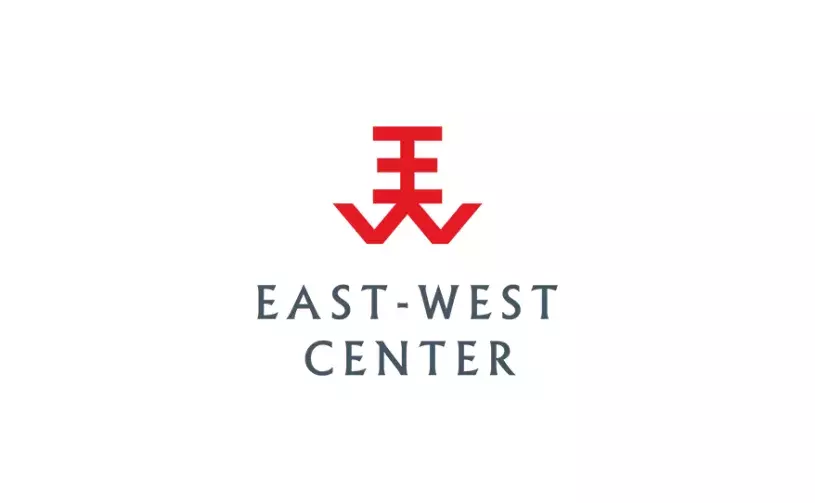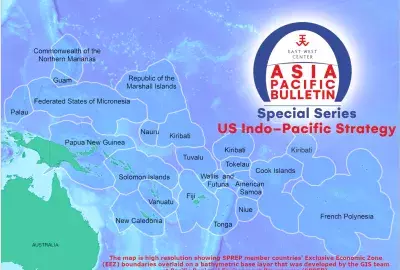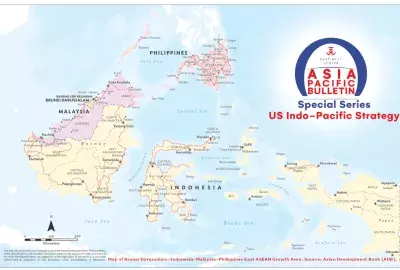Error message

|
Hanna Foreman, East-West Center in Washington Young Professionals Program alumna, explains that “Timor Leste’s bid [to join ASEAN] is still being held up because of a lack of consensus among members’ perceptions of Timorese economic and political fitness.” |
Timor-Leste is a small democratic country in an increasingly strategic region. Since gaining independence in 2002, Timor-Leste has made remarkable progress as Asia’s youngest democracy, but it has a long way to go in improving its economic and political situation. ASEAN membership for the Timorese is viewed as a way to reconcile economic, security, and geopolitical interests, while carving out a regional identity. Timor-Leste’s push for ASEAN membership started in 2011 and intensified during the latter half of 2019 when Foreign Minister Dionisio Babo Soares visited all ten ASEAN capitals in the summer followed by ASEAN fact finding missions in Dili in the fall. While Timor-Leste’s response to COVID-19 is impressive, the economic toll continues to be severe. Therefore, ASEAN membership is a comparatively lower priority this year, but is still under consideration by members, based on Vietnamese Prime Minister Nguyen Xuan Phuc’s speech during the recent ASEAN Summit.
The ASEAN Charter stipulates that prospective members must be located in Southeast Asia, recognized by all member states, abide by the Charter, and have the “ability and willingness” to carry out all membership obligations. Timor-Leste fits the geographic requirement; the government has devoted considerable resources to meet membership criteria, including opening embassies in all ten ASEAN capitals, conducting peaceful elections, and actively participating in ASEAN meetings. For a country of 1.3 million people with a GDP of $1.4 billion, such efforts are significant. Even with such continued efforts, Timor Leste’s bid is still being held up because of a lack of consensus among members’ perceptions of Timorese economic and political fitness.
Regional Narratives
Timor-Leste faces challenges among ASEAN members as well as domestic and geopolitical hurdles that prevent it from gaining membership. Within ASEAN, nine out of ten member states currently support Timor-Leste’s bid, with Singapore stopping short of endorsing the bid. Given that it is one of the most prosperous ASEAN members, Singapore is still dubious of Timor-Leste's readiness for membership, and fears Dili may “unravel” ASEAN’s plans for economic integration. Many of Singapore’s fears are corroborated by Timor-Leste’s economic dependency on foreign aid ,and dwindling oil and gas revenues. In addition, Timor-Leste’s health and education indicators are among worst in Southeast Asia, further challenging the readiness narrative.
In contrast to Singaporean opposition, Indonesia is one of the major advocates of the country’s membership bid. Despite the two countries’ traumatic history, Timorese relations with Indonesia are mostly positive because of strong economic ties and ability to resolve political disputes. Indonesian investment in Timor-Leste is estimated to be $595 million, according to 2019 figures, while bilateral trade was recorded at $193 million in 2018. In addition, Indonesia has continued to promote Timor-Leste as an emerging regional player by encouraging Timorese representatives to attend regional economic forums as well as providing aid that supports an estimated 30% of Dili’s needs.
On the political front, Indonesia has countered Singapore’s case against Dili’s accession by arguing that Timor-Leste is prepared for membership because of Indonesian capacity building programs and Timorese diplomatic outreach over the years. Indonesia’s motives are also geopolitical: since both countries share a border, a weak Timor-Leste may impact Indonesian security, while a strong neighbor may increase energy investment and partnership opportunities.
International Narratives
Similar to Indonesia, Australia played a critical role in Timor-Leste’s history by leading the international peacekeeping and humanitarian efforts that paved the way for independence. Although relations in the past decade have been testy at times as a result of espionage scandals and maritime border disputes, Australia is a major ally of Timor-Leste. Within the Indo-Pacific, Australia is one of Timor-Leste’s largest donors – contributing $100.7 million in official development assistance during the 2019-2020 fiscal year. Australian aid in Timor-Leste tends to emphasize preparation for ASEAN membership and aims to curb public health, gender, income, education, and governance disparities. On the regional level, Australia continues to be a vocal advocate for ASEAN accession with many Australian officials pledging to lobby Singapore into supporting Dili’s bid and to overlook its economic flaws.
Along with Australia, the United States also supports Timor-Leste’s ASEAN membership bid and contributes over $200 million annually in foreign aid. Similar to regional allies, US aid is strategically allocated towards capacity building and democratic initiatives, such as expanding cash crop industries, promoting tourism, improving infrastructure, and strengthening government institutions, in order to encourage economic diversification, a main Singaporean concern. By highlighting potential Timorese economic contributions, the US seems to push the narrative that ASEAN membership will allow Dili to open up regionally and provide more economic opportunities for its citizens.
China’s partnership with Timor-Leste is a stark contrast to the Australian and American approaches. Over the years, Chinese influence in Southeast Asia has become a complex and divisive issue within ASEAN. While Chinese aid has benefited Cambodia and Laos, territorial disputes and increasing influence have forced the remaining eight ASEAN members to either balance, hedge, or band-wagon with China and the US. This three-way dilemma among ASEAN members has prevented ASEAN from forming a unified position on Chinese activities in the region.
As of now Timor-Leste has not taken out a large Chinese loan, however, Chinese aid has resulted in major infrastructure projects, such as the construction of Tibar Port, the national power grid, and government buildings. Although Chinese assistance is one solution to close infrastructure and human development gaps, Dili’s growing reliance on China may complicate ASEAN membership prospects as current ASEAN members struggle to cogently define China’s role in Southeast Asia.
As Timor-Leste continues to carve out a role in a world complicated by the COVID-19 pandemic and an intensified US-China rivalry, ASEAN membership continues to be a prominent foreign policy goal. While Timor-Leste continues to prove its readiness for membership, heavy reliance on foreign aid and poor economic indicators have put ASEAN members at an impasse on admitting a potential eleventh member. ASEAN traditionally favors consensus and non-interference. While admitting Timor-Leste may improve democratic legitimacy and regional unity, it may also exacerbate divisions and challenge ASEAN’s fragile status quo. Therefore, Timor-Leste’s ASEAN prospects are beyond the control of development indicators and contingent on ambiguous perceptions.
|
Hanna Foreman, East-West Center in Washington Young Professionals Program alumna, explains that “Timor Leste’s bid [to join ASEAN] is still being held up because of a lack of consensus among members’ perceptions of Timorese economic and political fitness.” |
Timor-Leste is a small democratic country in an increasingly strategic region. Since gaining independence in 2002, Timor-Leste has made remarkable progress as Asia’s youngest democracy, but it has a long way to go in improving its economic and political situation. ASEAN membership for the Timorese is viewed as a way to reconcile economic, security, and geopolitical interests, while carving out a regional identity. Timor-Leste’s push for ASEAN membership started in 2011 and intensified during the latter half of 2019 when Foreign Minister Dionisio Babo Soares visited all ten ASEAN capitals in the summer followed by ASEAN fact finding missions in Dili in the fall. While Timor-Leste’s response to COVID-19 is impressive, the economic toll continues to be severe. Therefore, ASEAN membership is a comparatively lower priority this year, but is still under consideration by members, based on Vietnamese Prime Minister Nguyen Xuan Phuc’s speech during the recent ASEAN Summit.
The ASEAN Charter stipulates that prospective members must be located in Southeast Asia, recognized by all member states, abide by the Charter, and have the “ability and willingness” to carry out all membership obligations. Timor-Leste fits the geographic requirement; the government has devoted considerable resources to meet membership criteria, including opening embassies in all ten ASEAN capitals, conducting peaceful elections, and actively participating in ASEAN meetings. For a country of 1.3 million people with a GDP of $1.4 billion, such efforts are significant. Even with such continued efforts, Timor Leste’s bid is still being held up because of a lack of consensus among members’ perceptions of Timorese economic and political fitness.
Regional Narratives
Timor-Leste faces challenges among ASEAN members as well as domestic and geopolitical hurdles that prevent it from gaining membership. Within ASEAN, nine out of ten member states currently support Timor-Leste’s bid, with Singapore stopping short of endorsing the bid. Given that it is one of the most prosperous ASEAN members, Singapore is still dubious of Timor-Leste's readiness for membership, and fears Dili may “unravel” ASEAN’s plans for economic integration. Many of Singapore’s fears are corroborated by Timor-Leste’s economic dependency on foreign aid ,and dwindling oil and gas revenues. In addition, Timor-Leste’s health and education indicators are among worst in Southeast Asia, further challenging the readiness narrative.
In contrast to Singaporean opposition, Indonesia is one of the major advocates of the country’s membership bid. Despite the two countries’ traumatic history, Timorese relations with Indonesia are mostly positive because of strong economic ties and ability to resolve political disputes. Indonesian investment in Timor-Leste is estimated to be $595 million, according to 2019 figures, while bilateral trade was recorded at $193 million in 2018. In addition, Indonesia has continued to promote Timor-Leste as an emerging regional player by encouraging Timorese representatives to attend regional economic forums as well as providing aid that supports an estimated 30% of Dili’s needs.
On the political front, Indonesia has countered Singapore’s case against Dili’s accession by arguing that Timor-Leste is prepared for membership because of Indonesian capacity building programs and Timorese diplomatic outreach over the years. Indonesia’s motives are also geopolitical: since both countries share a border, a weak Timor-Leste may impact Indonesian security, while a strong neighbor may increase energy investment and partnership opportunities.
International Narratives
Similar to Indonesia, Australia played a critical role in Timor-Leste’s history by leading the international peacekeeping and humanitarian efforts that paved the way for independence. Although relations in the past decade have been testy at times as a result of espionage scandals and maritime border disputes, Australia is a major ally of Timor-Leste. Within the Indo-Pacific, Australia is one of Timor-Leste’s largest donors – contributing $100.7 million in official development assistance during the 2019-2020 fiscal year. Australian aid in Timor-Leste tends to emphasize preparation for ASEAN membership and aims to curb public health, gender, income, education, and governance disparities. On the regional level, Australia continues to be a vocal advocate for ASEAN accession with many Australian officials pledging to lobby Singapore into supporting Dili’s bid and to overlook its economic flaws.
Along with Australia, the United States also supports Timor-Leste’s ASEAN membership bid and contributes over $200 million annually in foreign aid. Similar to regional allies, US aid is strategically allocated towards capacity building and democratic initiatives, such as expanding cash crop industries, promoting tourism, improving infrastructure, and strengthening government institutions, in order to encourage economic diversification, a main Singaporean concern. By highlighting potential Timorese economic contributions, the US seems to push the narrative that ASEAN membership will allow Dili to open up regionally and provide more economic opportunities for its citizens.
China’s partnership with Timor-Leste is a stark contrast to the Australian and American approaches. Over the years, Chinese influence in Southeast Asia has become a complex and divisive issue within ASEAN. While Chinese aid has benefited Cambodia and Laos, territorial disputes and increasing influence have forced the remaining eight ASEAN members to either balance, hedge, or band-wagon with China and the US. This three-way dilemma among ASEAN members has prevented ASEAN from forming a unified position on Chinese activities in the region.
As of now Timor-Leste has not taken out a large Chinese loan, however, Chinese aid has resulted in major infrastructure projects, such as the construction of Tibar Port, the national power grid, and government buildings. Although Chinese assistance is one solution to close infrastructure and human development gaps, Dili’s growing reliance on China may complicate ASEAN membership prospects as current ASEAN members struggle to cogently define China’s role in Southeast Asia.
As Timor-Leste continues to carve out a role in a world complicated by the COVID-19 pandemic and an intensified US-China rivalry, ASEAN membership continues to be a prominent foreign policy goal. While Timor-Leste continues to prove its readiness for membership, heavy reliance on foreign aid and poor economic indicators have put ASEAN members at an impasse on admitting a potential eleventh member. ASEAN traditionally favors consensus and non-interference. While admitting Timor-Leste may improve democratic legitimacy and regional unity, it may also exacerbate divisions and challenge ASEAN’s fragile status quo. Therefore, Timor-Leste’s ASEAN prospects are beyond the control of development indicators and contingent on ambiguous perceptions.







